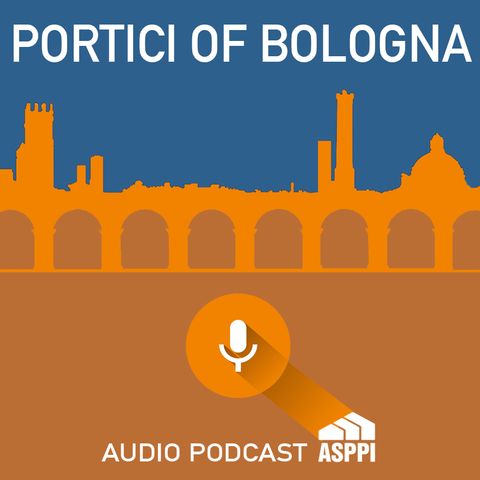Portici of Bologna. Strada Maggiore (English)

Scarica e ascolta ovunque
Scarica i tuoi episodi preferiti e goditi l'ascolto, ovunque tu sia! Iscriviti o accedi ora per ascoltare offline.
Descrizione
Strada Maggiore is one of the oldest streets of Bologna. From Roman times, it has been one of the main entrances to the town from the via Aemilia. It starts...
mostra di piùMany historical triumphal parades into Bologna were via this street, for example that of pope Julius II in 1506 or of Giuseppe Garibaldi in 1860. Its porticoes vary in height, architecture, and history: from ceilings made of wooden horizontal beams to those with high groin vaults, supported by pillars or columns with smooth, octagonal, or composite shafts with capitals going from water-leaf design to composite Corinthian.
From Piazza di Porta Ravegnana in the direction of Porta Maggiore, the first notable portico is the one enclosing the church of Saints Bartolomeo and Gaetano. Planned at the beginning of the 1500s as civic portico of a palazzo for the Gozzadini family, by Andrea Marchesi known as Formigine it is a masterpiece of Renaissance architecture with its wide full archways and sandstone pilasters decorated with candelabra. Its function became that of a religious portico for the church as the palazzo was never built.
Slightly further along is the portico of Casa Isolani of the 1200s where tall oak supports, 9 metres high! shape the portico upholding the top level of the house. In its ceiling are three arrows connected to various legends of which one is that three crooks whilst trying to rob a passer-by were distracted by a naked woman and shot their arrows at the ceiling by mistake.
Many important people have strolled along Strada Maggiore's porticos over the centuries, some living in the palazzi above them, like Gioachino Rossini, Giosuè Carducci and tenor Domenico Donzelli. Some of these buildings were famous for cultural gatherings, the salotti, like that of the Rossini home where the most important men of culture of Bologna would attend, or Palazzo Sanguinetti, which had writer Stendhal amongst its visitors.
Under the portico between Palazzo Sanguinetti and Casa Masetti is the lower part of the Tower of the Oseletti of the 12th century, originally one of the highest of Bologna, 70 metres high, a height forcibly reduced by the authorities to less than half.
At no 42, one cannot help but notice the keystone terracotta masks (mascheroni) of the late 1700s of the portico of Palazzo Bianchetti, once Tartagni: some are screaming and look uncannily like devils.
One of the most beautiful examples of porticoes and the widest of Bologna is the devotional “dei Servi” with interesting three-part shaft columns in Verona marble.
Its building started in the 1300s and the portico side on the Strada Maggiore was first frescoed in the 1400s. This work was covered by new ones in the 1600s these depicting episodes of the life of the Order of the Serviti founder. The portico was completed in the 1800s when the four-sided porch of the basilica Santa Maria dei Servi, was built. The church holds the Maestà painting by Cimabue.
These are the porticoes where every year at Christmas the Santa Lucia Fair is held.
Of the end of the 1700s is Palazzo Ercolani: now property of the University of Bologna.
Strada Maggiore ends at Porta Maggiore, "honorary gate" of the city from which the via Emilia continues through Romagna. This city gate was built in the second half of the 1200s and over the centuries adapted to the city's needs. Excavations at the beginning of the 1900s freed the original section which we can still see today.
By Antonella Merletto Architectural historian and Official Tour Guide.
Antonella has a degree in Architecture, a post-degree specialization in Ancient Greek and Roman Architecture and a PhD in Ancient Architecture. Antonella is British-Italian and is bilingual. She teaches History of Art, History of Architecture and Archaeology in various American Universities in Rome and is an Official Tour Guide.
Informazioni
| Autore | ASPPI |
| Organizzazione | ASPPI |
| Sito | - |
| Tag |
Copyright 2024 - Spreaker Inc. an iHeartMedia Company

Commenti